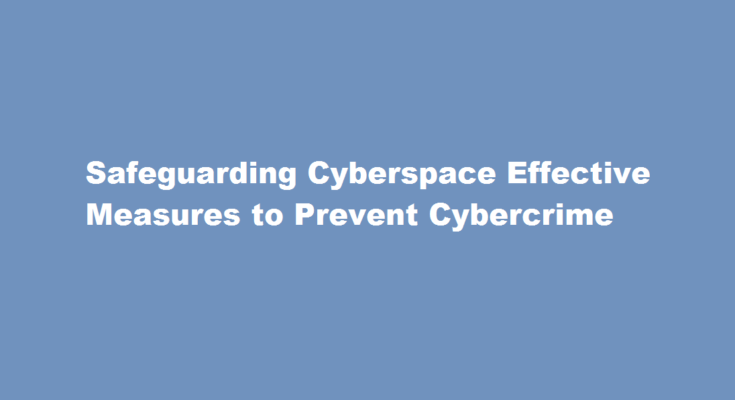Introduction
In today’s interconnected world, the threat of cybercrime looms large, with individuals, businesses, and governments increasingly falling victim to cyber attacks. However, by adopting proactive measures and staying informed about potential risks, we can significantly reduce our vulnerability to these malicious activities. This article presents practical guidelines and insights to help individuals and organizations prevent cybercrime, ensuring a safer and more secure digital environment for all.
Strengthening Password Security
One of the simplest yet most effective ways to prevent cybercrime is by strengthening password security. Weak and easily guessable passwords create opportunities for hackers to gain unauthorized access. It is crucial to use complex passwords that incorporate a combination of uppercase and lowercase letters, numbers, and special characters. Additionally, adopting two-factor authentication adds an extra layer of protection, requiring users to verify their identity through a separate device or app.
Regular Software Updates and Patch Management
Keeping software and operating systems up to date is paramount to safeguarding against cyber threats. Developers continually release updates and patches that address vulnerabilities discovered in their software. Neglecting these updates can leave systems exposed to exploitation by hackers. Enabling automatic updates ensures that the latest security fixes are promptly installed, reducing the risk of cyber attacks. It is also important to regularly update and patch other software, such as web browsers and antivirus programs, to maintain a robust defense against emerging threats.
Educating and Raising Awareness
Knowledge is a powerful tool in the fight against cybercrime. Educating individuals about the various types of cyber threats, such as phishing, malware, and social engineering, empowers them to identify and avoid potential risks. Promoting awareness campaigns through seminars, workshops, and online resources can equip people with the necessary skills to recognize suspicious emails, websites, and downloads. Additionally, instilling a culture of cybersecurity within organizations ensures that employees understand the importance of adhering to best practices, such as avoiding clicking on unknown links or sharing sensitive information.
Implementing Robust Firewalls and Antivirus Software
Firewalls act as the first line of defense against unauthorized access to computer systems. These protective barriers monitor incoming and outgoing network traffic, blocking any suspicious or malicious activities. Coupled with reliable antivirus software, which detects and eliminates malware, this combination forms a potent shield against cyber threats. It is vital to choose reputable security solutions and regularly update them to stay ahead of evolving threats. Moreover, organizations should consider deploying next-generation firewalls that offer advanced intrusion prevention and real-time threat intelligence.
Regular Data Backups and Secure Storage
Data loss due to cyber attacks can be devastating. Implementing a robust backup strategy ensures that critical information is protected and can be recovered in the event of a security breach. Regularly backing up data to offline or cloud-based storage systems adds an extra layer of security. Cloud storage providers often employ advanced encryption techniques, making it difficult for cybercriminals to gain unauthorized access to sensitive information. Organizations should establish backup schedules and periodically test the restoration process to verify the integrity and availability of their backup data.
FREQUENTLY ASKED QUESTIONS
How cyber crime could be prevented?
Anti-virus software allows you to scan, detect and remove threats before they become a problem. Having this protection in place helps to protect your computer and your data from cybercrime, giving you peace of mind. Keep your antivirus updated to receive the best level of protection.
Why is it important to prevent cybercrime?
One single security breach can lead to exposing the personal information of millions of people. These breaches have a strong financial impact on the companies and also loss of the trust of customers. Hence, cyber security is very essential to protect businesses and individuals from spammers and cyber criminals.
How can cyber attacks be controlled?
Cyber attacks can be prevented by being aware of the various types of protocols, exploits, tools, and resources used by malicious actors. In addition, knowing where and how to expect attacks ensure you’re creating preventative measures to protect your systems.
Conclusion
Preventing cybercrime is an ongoing effort that requires vigilance, awareness, and the adoption of robust security measures. By following the guidelines outlined in this article, individuals and organizations can significantly reduce their susceptibility to cyber threats. Strengthening password security, keeping software up to date, educating and raising awareness, implementing firewalls and antivirus software, and maintaining regular data backups all contribute to a safer digital environment. As technology advances, it is essential for individuals and organizations to remain proactive and adapt their security practices to stay one step ahead of cybercriminals. Together, we can build a more secure and resilient cyberspace.
Read Also : Unzipping Files Made Easy A Comprehensive Guide on How to Extract ZIP Files



